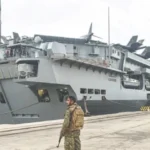Introduction:
On October 15, 2024, North Korea made headlines once again by blowing up several roads that had previously connected the isolated regime to South Korea. This move further escalates the already strained relationship between the two Koreas, casting a dark shadow over the fragile peace that has always been at risk in the region. The destruction of these critical infrastructures signals a clear shift in North Korea’s strategy, raising concerns about the future of inter-Korean relations, peace, and stability on the Korean Peninsula.
- Introduction:
- Historical Context: The Fragile Relationship Between North and South Korea
- Why Did North Korea Destroy the Roads?
- Military Implications and Regional Security Concerns
- Economic Impact on the Korean Peninsula
- Humanitarian Consequences
- International Reaction and Diplomatic Challenges
- What’s Next for North-South Relations?
The severing of these roads, which symbolize rare moments of cooperation between North and South Korea, serves as a stark reminder of the unpredictability of Pyongyang’s policies. This aggressive step not only limits the physical connection between the two countries but also reflects the regime’s growing unwillingness to engage in any diplomatic efforts. Experts around the world are now closely monitoring the situation, as this move could have significant military, political, and economic consequences for the region.
________________________________________________
Historical Context: The Fragile Relationship Between North and South Korea
The relationship between North and South Korea has been one of the most complex and volatile in modern history. Since the Korean War (1950–1953), the two countries have technically remained at war, as no peace treaty was signed. The Demilitarized Zone (DMZ) that separates the two nations stands as one of the most heavily fortified borders in the world, serving as a constant reminder of the unresolved conflict.
Over the years, attempts have been made to thaw the frosty relations between the North and the South. These efforts have included summits, family reunions, economic cooperation, and the establishment of transportation links, such as the now-destroyed roads. However, the path to peace has always been fraught with setbacks, with North Korea often reverting to hostile actions whenever diplomatic talks seemed to progress. The destruction of these roads marks the latest in a series of provocations by Pyongyang, once again raising the question of whether peace on the Korean Peninsula is achievable.
________________________________________________
Why Did North Korea Destroy the Roads?
The decision to blow up the roads connecting North Korea to South Korea appears to be a calculated move by Kim Jong-un’s regime, aimed at reinforcing the country’s isolationist stance. Analysts suggest that this act serves multiple purposes, each of which ties into North Korea’s broader geopolitical strategy.
First, it underscores North Korea’s desire to cut off any avenues of cooperation with the South, especially in the wake of increased tensions regarding military exercises and sanctions. By destroying these roads, Pyongyang sends a clear message that it no longer seeks economic or humanitarian assistance from its southern neighbor. This aligns with the regime’s long-standing policy of self-reliance, or juche, which emphasizes economic independence and the rejection of foreign aid.
Second, the destruction of the roads could be interpreted as a form of protest against the South Korean government’s close alliance with the United States. In recent months, joint military exercises between South Korea and the U.S. have angered Pyongyang, leading to heightened tensions. Blowing up the roads may be North Korea’s way of expressing its discontent with what it perceives as provocative actions by the South.
Finally, the move could be seen as an attempt to consolidate internal power. By taking such a bold and aggressive action, Kim Jong-un may be seeking to reinforce his authority within the regime and show that he is unyielding in the face of external pressure. This is especially important as North Korea continues to grapple with internal challenges, including food shortages, economic difficulties, and the ongoing effects of international sanctions.
________________________________________________
Military Implications and Regional Security Concerns
The destruction of the roads connecting North and South Korea has significant military implications. These roads, although symbolic, also served as potential routes for the movement of troops and supplies in the event of a conflict. By eliminating these pathways, North Korea has made it more difficult for any future military cooperation between the two nations, thereby increasing the likelihood of further isolation.
This act also raises concerns about the potential for military escalation in the region. North Korea’s decision to blow up the roads could be seen as a prelude to more aggressive actions, including missile tests or military exercises. With the country’s history of unpredictable behavior, neighboring nations, particularly South Korea and Japan, are on high alert. The risk of miscalculation or unintended escalation remains high, and any further provocations by North Korea could quickly spiral into a more serious conflict.
Additionally, the destruction of the roads may prompt a response from the United States, which has a vested interest in maintaining stability on the Korean Peninsula. The U.S. has consistently reaffirmed its commitment to defending South Korea against any potential threats from the North, and this latest action may lead to increased military presence in the region or a strengthening of the U.S.-South Korea alliance.
________________________________________________
Economic Impact on the Korean Peninsula
The destruction of the roads also has significant economic implications for both North and South Korea. Although trade between the two countries has been severely restricted due to international sanctions, the roads represented a glimmer of hope for future economic cooperation. In the past, these connections facilitated limited exchanges, such as joint industrial projects and humanitarian aid deliveries.
For South Korea, the loss of these roads diminishes the possibility of future economic engagement with the North. President Yoon Suk-yeol’s administration has expressed a desire to pursue diplomacy and economic cooperation with North Korea, contingent on denuclearization. However, this latest move by Pyongyang suggests that any hope for renewed economic ties may be unrealistic in the near future.
For North Korea, the economic impact is less clear. The regime has long relied on its isolationist policies and has managed to survive despite being cut off from much of the global economy. However, with international sanctions continuing to cripple its economy, the destruction of these roads represents a missed opportunity for potential economic relief through cooperation with the South. In the long term, North Korea’s refusal to engage economically with its southern neighbor could exacerbate the country’s financial difficulties and further isolate it from the global community.
________________________________________________
Humanitarian Consequences
The destruction of the roads also has significant humanitarian consequences, particularly for families that remain separated between North and South Korea. These roads once served as vital links for reunions between families divided by the Korean War. Although such reunions have been rare and highly controlled, they provided a glimmer of hope for families torn apart by the conflict.
With these roads now destroyed, the possibility of future reunions seems even more remote. This is a devastating blow for the families who have been waiting for years to see their loved ones. The destruction of these connections symbolizes not only a physical barrier but also an emotional one, further deepening the divide between the people of North and South Korea.
________________________________________________
International Reaction and Diplomatic Challenges
The international community has responded with concern to North Korea’s destruction of the roads. The United Nations, which has long advocated for peace and stability on the Korean Peninsula, has called for restraint on both sides. However, the global community’s ability to influence North Korea’s behavior remains limited, given the regime’s disregard for international norms and its rejection of outside intervention.
Diplomatic efforts to ease tensions on the Korean Peninsula are likely to face significant challenges in the wake of this latest provocation. The U.S. and South Korea have consistently pushed for dialogue and denuclearization, but North Korea’s actions suggest that it is not interested in engaging in meaningful negotiations at this time. This leaves the international community with few options other than continued sanctions and diplomatic isolation, both of which have so far failed to change Pyongyang’s behavior.
________________________________________________
What’s Next for North-South Relations?
The destruction of the roads connecting North and South Korea marks a significant setback in efforts to improve relations between the two countries. With diplomatic channels effectively closed and tensions running high, the future of inter-Korean relations appears bleak. The possibility of renewed dialogue seems unlikely in the near future, as both sides continue to engage in hostile rhetoric and actions.
For the time being, the situation on the Korean Peninsula remains precarious. North Korea’s destruction of the roads is a clear indication that it is unwilling to pursue peaceful engagement with the South, and the risk of further provocations remains high. As the world watches and waits, the hope for a peaceful resolution to the long-standing conflict between North and South Korea seems as distant as ever.
#NorthKorea #KoreanPeninsula #InterKoreanRelations #TensionsInKorea #NorthKoreaNews







